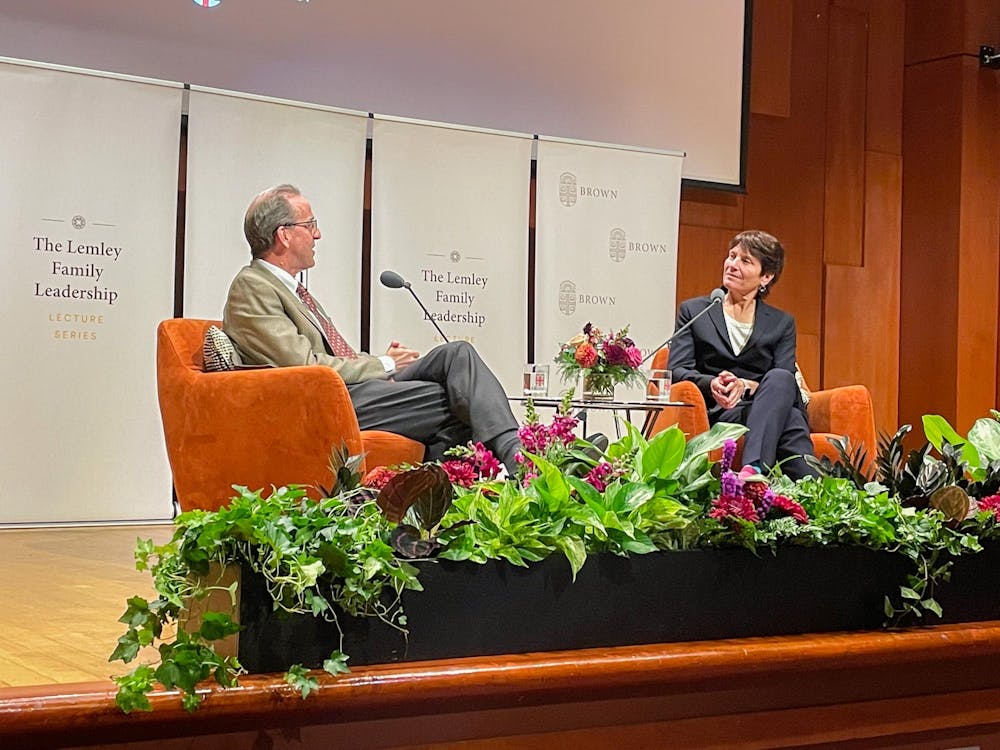From the moment Carolyn Bertozzi learned she had won the 2022 Nobel Prize in Chemistry, “it was a whirlwind,” she said. “It’s a lot of attention that scientists are not generally accustomed to.”
The Herald spoke with Bertozzi ahead of her Wednesday evening talk for the Lemley Family Leadership Lecture Series about her time in research and life experiences.
Working in a male-dominated field, Bertozzi was the eighth woman to earn a Nobel Prize in Chemistry and the only woman awarded in the sciences in 2022.
That year, Bertozzi and another researcher became the first openly LGBTQ+ people to earn a Nobel Prize in the sciences. Before 2022, only six other openly LGBTQ+ people had ever been awarded a Nobel Prize — all in literature.
When reflecting on how her identity has impacted her life experiences, she said it “has in ways I wouldn’t even necessarily be aware of.”
Bertozzi attended Harvard as an undergraduate, switching her degree from biology to chemistry after finding a passion for the field in her organic chemistry course. During this time, she worked for a physical chemist, despite her love for organic chemistry, since “a woman couldn’t get a job in an organic synthesis lab,” she said.
After repeatedly trying to land a position in an organic lab, she was recruited by an assistant professor who “was probably going to get denied tenure.” But Bertozzi quickly found that she had to take on “a lot more responsibility” than she would have had in a more established lab.
“I was the only person on a new project and he treated me like a postdoc,” she explained. This informative experience convinced Bertozzi that she wanted to attend graduate school, leading her to the West Coast, where she earned a PhD in organic chemistry at the University of California, Berkeley.
She arrived at Berkeley as a proud member of the LGBTQ+ community, but this was unusual: In the ’80s, “people were afraid to be out,” Bertozzi said, citing a fear associated with the AIDS epidemic and the lack of legal protections against discrimination.
“Women (also) weren't taken seriously as scientists because men saw them as a dating prospect,” Bertozzi added. But being queer, “all these men didn’t really know how to interact with me. … They honestly interacted with me like I was one of the guys.”
As the pioneer of bioorthogonal chemistry — the study of rapid chemical reactions that can take place inside the body without disrupting biological processes — Bertozzi’s work has been instrumental in designing therapeutics, observing living systems and creating diagnostic tools.
While introducing her at Wednesday’s event, Provost Francis Doyle said that Bertozzi was integral in “training the next generation of scientists in both chemistry and biology.”
After graduation, Bertozzi took an interest in glycans — sugars that sit on the surfaces of cells. Bertozzi hoped to uncover a way to track the movement of these sugars without interfering with the natural chemistry occurring in an organism’s body.
Around that same time, the field of click chemistry — which involved optimizing chemical reactions for speed and efficiency — was exploding. Bertozzi applied the field’s findings in bioorthogonal chemistry via attachable fluorescent alkynes, using fluorescent alkyne-glycan complexes to visualize and track glycans.
Since this pivotal moment, the research has exploded in applicability. Taking root in diagnostic strategies and new medicines, Bertozzi’s work has assisted in the creation of new cancer treatment drugs, vaccines and degraders of extracellular waste.
With the constant revision and progression of Bertozzi’s research, Doyle asked her how she deals with failure and maintains patience. Her advice: Live in the moment.
“If your goal every day is to try and contribute something and try to learn something new, … your chances of feeling successful are high because on any given day you’ll learn something,” she said.
In the audience question-and-answer session, Tasawwar Rahman ’26, a current Herald columnist, asked what current undergraduate students should be thinking about when “finding a specific niche in research.”
Bertozzi said that the mere participation in research, regardless of the field, is beneficial for undergraduates as “every research experience you have helps build your cognitive muscles.”
“Just the whole process of starting a project from scratch … transcends any specific research problem,” Bertozzi added. “Over time, your specific individual interests will start to crystallize.”

Owen Dahlkamp was the managing editor of newsroom on The Herald's 135th Editorial Board, overseeing the paper's news operations. Hailing from San Diego, CA, he is concentrating in Political Science and Cognitive Neuroscience with an interest in data analytics. In his free time, you can find him making spreadsheets at Coffee Exchange.





